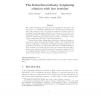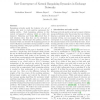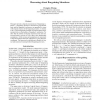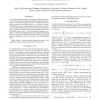107
click to vote
MSS
2011
IEEE
14 years 9 months ago
2011
IEEE
We consider bargaining problems under the assumption that players are loss averse, i.e., experience disutility from obtaining an outcome lower than some reference point. We follow...
JAIR
2008
15 years 2 months ago
2008
Shapley's impossibility result indicates that the two-person bargaining problem has no non-trivial ordinal solution with the traditional game-theoretic bargaining model. Alth...
114
click to vote
CORR
2010
Springer
15 years 2 months ago
2010
Springer
This paper tackles the problem of how two selfish users jointly determine the operating point in the achievable rate region of a two-user Gaussian interference channel through barg...
137
click to vote
CORR
2010
Springer
15 years 2 months ago
2010
Springer
Bargaining networks model the behavior of a set of players who need to reach pairwise agreements for making profits. Nash bargaining solutions in this context correspond to soluti...
141
click to vote
ICALP
2010
Springer
15 years 4 months ago
2010
Springer
We study bargaining games between suppliers and manufacturers in a network context. Agents wish to enter into contracts in order to generate surplus which then must be divided amon...
100
click to vote
AAAI
2007
15 years 4 months ago
2007
This paper presents a logical axiomatization of bargaining solutions. A bargaining situation is described in propositional logic and the bargainers’ preferences are quantified ...
110
click to vote
ICASSP
2009
IEEE
15 years 8 months ago
2009
IEEE
A precoding strategy for multi-user spectrum sharing over an interference channel is proposed and analyzed from a game-theoretic perspective. The proposed strategy is based on fi...
107
click to vote
IAT
2009
IEEE
15 years 8 months ago
2009
IEEE
It is a challenging problem to find agents’ rational strategies in bargaining with incomplete information. In this paper we perform a game theoretic analysis of agents’ ratio...




